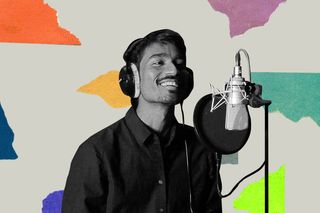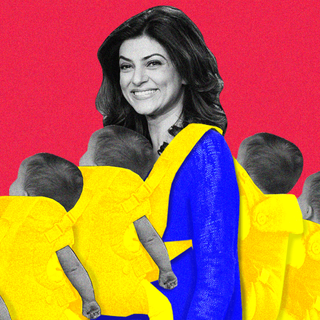
Overrated, Not: ‘Why This Kolaveri Di?’
This widespread popularity attracted scorn from music zealots who dismissed the song as low-brow, irritating, and lazy. But was it?

In ‘Overrated, Not,’ we revisit things that were so good, they quickly turned bad, and make a case for why they deserve a comeback.
Shortly after the world turned a corner into the second decade of the 21st century, a curious phenomenon gripped the country. It was the first homegrown “viral” hit; a kitschy, campy mishmash of folk music and YouTube parody. Not many knew what to make of “Why This Kolaveri Di?” — and nobody more so than the media.
This was a cringe video before they became ironically funny, a meme before they existed so ubiquitously, and a catchy earworm all rolled into one, without really making any claims as to what it really was. In its own time, it would come to usher a cultural paradigm shift.
How the song was discussed depended on where you came from. If you were from Tamil Nadu, you would have laughed rambunctiously at the song’s audacity. If you were from any other southern state, you would have felt vicarious joy for your compatriots against combined stereotyping from the north. And if you were from the north, you most likely heaped praise and validation on it as though anybody asked, or you tut-tutted your disapproval of cultural degradation, the way Javed Akhtar did.
You may have also seen cringe versions of the song in political campaigns, advertisements, really every form of media imaginable. Soon, it inspired several uninspiring copycats. Actor Dhanush’s presence in it was a point of ire among those who took issue with his glorification of stalking in films. Over time, we began to discuss what, exactly, “Kolaveri” means.
This widespread popularity attracted scorn from music zealots who dismissed the song as low-brow, irritating, and lazy. But was it?
Yes, in part — but also not. The song is slow, lazy, yes — but it knew that. What also made it so appealing was its tongue-in-cheek self-awareness about its low-brow-ness (“Kai-la glass-u — only English please – hand-la glass-u”). The song defies any attempt to seriously discuss its relevance because it stems from a place of sheer irreverence. How serious can you be if you want to talk about the quality of something with lyrics like “distance-u la moon-u moon-u, moon-u color-u white-u” without coming across as self-important, snobbish, and a little foolish?
And yet, critics denounced it as a “nonsense” song. However, the song never claimed to be anything but. It even starts by calling itself a “flop song,” not knowing or perhaps, not expecting deep down that it would break the Internet before that even became a thing. The ironic self-awareness was the whole point. Nobody involved in its making knew what they were really doing and had no qualms admitting it.
Related on The Swaddle:
Overrated, Not: ‘The Little Mermaid’
It’s really the “Tanglish” — Tamil plus English — slang that makes the song so iconic. Added to that are the instruments, featuring thavil and urumi drums, which makes it all the more playful and even subversive. The composition carries a distinctly Tamilian flavor, which, along with the slang and the accent, reclaims the parts of everyday Tamil culture that are usually a target of scorn.
Lofty postcolonial discourses talk about the “chutnification” of English, a term coined by Salman Rushdie to refer to the blend of Hindi and Urdu words and slang in English. This forms a hybrid, uniquely desi style of language. What precludes the Tanglish lyrics and the mix of folk instruments with the sax from such an analysis too? Arguably, detractors of the song may not like the fact that a potpourri of Internet culture and Tamil sensibilities can also be culturally significant — even worthy of discussion as “good” art.
As The Guardian notes: “Regional English accents in India, Tamil being a case in point, are often caricatured by the anglicized urbane India, and stereotypes of vernacular accents are often inserted in Bollywood films for humorous effect.“Kolaveri Di” reverses this psychology; it challenges the sclerotic ownership of the English language.”
In other words, the song intercepted taunts and hoity-toity criticism about its quality from our cousins up north before they even had a chance to voice them. As a demographic painfully used to “Madrasi” humor and cultural stereotyping, there is something about Dhanush embracing his accent and half-jokingly slurring and drawling his way through the song that makes it the coolest uncool song ever. Because this is, by all accounts, a pretty uncool song. It’s for “soup boys” — men of the borderline incel variety who crib about not “getting” the girl of their dreams.
I’m going to step outside my feminist shoes for a minute here to talk about the obvious. Why was such a whiny, entitled lament about “love failure” the biggest Internet hit of a generation? Whoever is singing “Why This Kolaveri” is clearly quite upset at a woman. They’re upset because she rejected him? Dumped him? Didn’t acknowledge his existence? Nobody is sure. But this is far from a murderous rant from a vengeful man. No, what makes this song so fun is that it’s sung by a loser who is painfully aware that he is one. One who is sloshed, serenading to his sloshed, “love-failure” companions. This isn’t for the girl of his dreams to hear at all; it’s a boozy, pathetic ramble among friends. And that’s what we love about it.
Amid so much machismo, unironic self-pity, god complexes, victim complexes, brawn, brashness, and sheer muscle we’ve come to expect of the hero, this is a strange and quaint departure. In the music video – if it can be called that – Dhanush, who wrote the song himself not quite knowing what he was writing, is just seen singing in a studio, a knowing smirk playing on his face throughout. This isn’t a song trying to style itself as anything but a low-effort enterprise achieved through an overnight scribbling of random lyrics and a catchy, self-mocking tune.
The song works because it never, ever takes itself seriously, and it doesn’t ask anyone else to either.
There is, ultimately, music that is good and serious — in that the lyrics are beautiful and poetic, the composition is sophisticated, and the singers are exceptionally gifted. Then there is music that is bad — it is a remix of an older good song, or a lazy synthetic pop track put together with lyrics about something cool, like partying or, say, partying.
And then, there is Kolaveri. What is it? Is it good, bad? OK? If you call it good, do you have bad taste? If you call it bad, are you a snob? And in creating this chaos in the world of music, Kolaveri was a moment in time where everybody, music snobs and plebs alike, could actually enjoy a silly song together without thinking about it too much. Dhanush, himself, had this to say about it: “It’s a very, very simple song, a very, very silly song.” It is a flop song that became the greatest hit of a generation, simply by being authentic and utterly unserious.
Rohitha Naraharisetty is a Senior Associate Editor at The Swaddle. She writes about the intersection of gender, caste, social movements, and pop culture. She can be found on Instagram at @rohitha_97 or on Twitter at @romimacaronii.
Related


‘Minnal Murali’ Subverts the Superhero Genre Through the Supersuit
